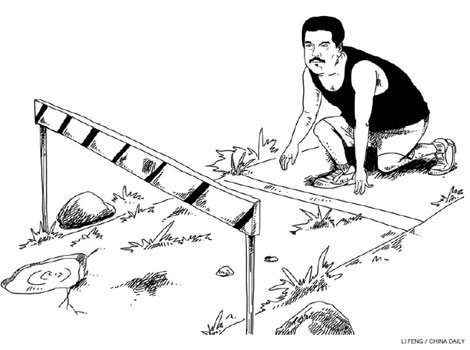Tough test awaits Maduro
Updated: 2013-04-19 07:13
By Sun Hongbo (China Daily)
|
|||||||||||

Nicolas Maduro, Venezuela's acting president and late president Hugo Chavez's designated successor, won a narrow victory in the April 14 presidential elections. Maduro secured 50.66 percent and opposition candidate Henrique Capriles 49.07 percent of the votes, according to the official tally.
Maduro is heavily influenced by Chavez and has said that oil, finance and international relations make up the political road map Chavez has left to him. His path, however, is full of challenges both on the domestic and foreign fronts. His government's primary task now is to ensure political and social stability in the country. But with a strengthened opposition, social and political confrontations have increased and are having a serious impact on the country's stability.
Chavez, given his charisma and leadership qualities, was in control of the government, parliament and local authorities through the ruling United Socialist Party and his political allies, many of whom were from the armed forces, within a democratic framework. In contrast, Maduro has to deal with the differences among the various political groups within the Chavez camp as well as the opposition to stabilize the political situation in the country.
On the economic development front, however, the Maduro government will not fully embrace Chavez's radical economic policies. Considering the political demands at home, Maduro will continue to implement Chavez's economic and social policies to some extent, but he will focus on pragmatic and sustainable economic policies to overcome Venezuela's economic difficulties.
The Maduro government has two options as far as economics is concerned. The first is to continue tightening regulations and control over prices, exchange rates and supply of certain commodities, which could lead to further distortions in the economy. But once the economy slows down, the government will be forced to take corrective measures, which would result in more regulatory policies.
The second option for Maduro is to relax the control over prices and exchange rates and strike a balance between government regulations and market mechanisms to improve the investment environment, so that more foreign and domestic capital flow into the economy.
It is very important that Maduro uses market mechanisms to the maximum to increase the production of agricultural goods, and food and general consumer products to ensure adequate supply in the domestic market. This will not only help overcome domestic shortage and ease inflationary pressures, but also save foreign exchange reserves and maintain the balance of payments. It will also help him divert more surplus revenue from oil exports to social utility, education, healthcare and other public areas.
The oil industry is the lifeblood of Venezuela's economy. The country's oil cooperation strategy is aimed at diversifying its oil export destinations, and the Maduro government will maintain Chavez's open policy of foreign cooperation. The excessive "politicization" of the Venezuela National Oil Company, and its debt burden and not-so-good competitive efficiency, however, could hinder the development of the country's oil industry.
In foreign policy terms, Chavez's anti-American diplomacy and alliance with the Latin American left has had a huge impact on Latin America's geopolitics. Since Venezuela has to maintain political and economic stability, and secure its oil exports, Maduro's foreign policy goal would be to create a favorable regional environment.
The Maduro government is, therefore, likely to consolidate its relations with Latin American left allies and improve ties with Latin American powers, including Colombia and other neighboring countries. The strengthening of relations with Latin American countries will help the Maduro government resist external interference in Venezuela's internal affairs. Nevertheless, Maduro has to change some of the cooperation mechanisms, such as the Bolivarian Alliance for the Americas and the Caribbean oil programs, to ease the country's financial burden.
Besides, the Maduro government is not expected to intensify its political conflict with the United States because that could jeopardize its oil exports. US-Venezuela relations are complex. Despite the US being the largest importer of Venezuela's crude oil and the largest source of its trade surplus, their political ties are not likely to improve in the short term. The two countries, though, will maintain a stable oil trade, and economic and trade cooperation out of political and economic choice.
Furthermore, the new government will continue using oil diplomacy to actively develop relations with big oil-consuming countries. To improve Venezuela's economy, Maduro has to secure its oil exports, import channels and sources of finance. Also, he has to deepen economic and trade cooperation with China, Russia, India and other countries outside the region.
China-Venezuela strategic partnership will continue to advance, with bilateral economic and trade cooperation, and political ties playing a greater role. Guided by the inter-governmental cooperation, coordination and decision-making framework, China and Venezuela have established a multi-layered cooperation model with energy at its core and fields such as infrastructure, industry, agriculture, science and technology forming the whole.
Owing to the complementary nature of the two economies, China will continue to be an important factor in Venezuela's oil diversification strategy. It will also be an important source of investment and financing for Venezuela. At present, the aim of bilateral economic and trade cooperation is to ensure the smooth completion of the existing agreements. But to consolidate trade relations, Chinese enterprises expect Venezuela to maintain a stable and favorable environment for cooperation, and ensure the stability and continuity of policies.
The author is an associate professor at the Institute of Latin American Studies, affiliated to the Chinese Academy of Social Sciences.
Today's Top News
Police continue manhunt for 2nd bombing suspect
H7N9 flu transmission studied
8% growth predicted for Q2
Nuke reactor gets foreign contract
First couple on Time's list of most influential
'Green' awareness levels drop in Beijing
Palace Museum spruces up
Trading channels 'need to broaden'
Hot Topics
Lunar probe , China growth forecasts, Emission rules get tougher, China seen through 'colored lens', International board,
Editor's Picks

|

|

|

|

|

|





